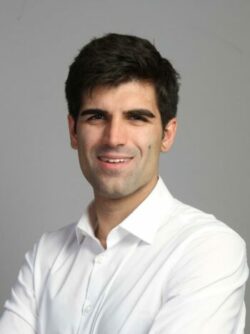I am Emanuele Silvio Gentile, an atmospheric physicist and climate modeler with a profound passion for unraveling the intricate links between turbulent processes in the boundary layer, the lowest part of the atmosphere where humans live, and their role in shaping extreme wind speeds and gusts associated with cyclones and thunderstorms. My academic journey commenced with a first-class degree in theoretical physics from Imperial College London, where my thesis earned me the Tessella prize for the innovative use of computational methods in physics. Subsequently, I pursued and completed a PhD in Atmosphere, Ocean, and Climate at the University of Reading in collaboration with the Met Office, under the guidance of Professor Suzanne Gray and Dr. Huw Lewis (Met Office).
The shift from theoretical physics to atmospheric physics and environmental sciences was driven by a keen desire to make a more direct impact with my research on the lives of others. The Scenario program played a pivotal role in developing the skills necessary for success in weather and climate science. From fluid dynamics classes to software training sessions, the program provided numerous opportunities to understand how to effectively communicate scientific research to the wider public through conferences, articles, and public engagement events. Moreover, the Scenario program, equipped us with the understanding of the complexity and importance of translating our scientific knowledge into business, a critical skill in modern science. This would have not been possible without the world-class professors working at the University of Reading, currently ranked 5th in world for Atmospheric Science, to which Scenario students are exposed on a daily basis. The social activities organized by Scenario also provided a valuable opportunity for relaxation after work and learning from diverse PhD colleagues.
Currently, as a postdoctoral research associate at the Princeton University/NOAA Geophysical Fluid Dynamics Lab (GFDL) in the United States, I focus on enhancing the representation of the effects turbulence on climate extremes in the leading GFDL climate model, under the guidance of Dr. Ming Zhao and Dr. Leo Donner. In particular, my research aims to address deficiencies observed in climate simulations of extreme wind speeds associated with tropical cyclones, storms, and thunderstorms, which have historically posed challenges in climate modeling. To achieve this, I am implementing a novel mathematical and physical representation of turbulence in the GFDL atmospheric climate model that adheres more closely to the governing Navier-Stokes equations, promising higher accuracy and generality compared to current modelling capabilities.
As a note to prospective PhD students in weather and climate sciences, I believe they should be aware of the challenges posed by the increasingly important role of artificial intelligence in producing and analysing weather forecasts, along with the growing precariousness of the academic job market. However, it is also an exciting time to be involved in the weather and climate field, with a new generation of climate models emerging capable of predicting Earth’s climate with an accuracy and efficiency unimaginable a decade ago. I firmly believe that participating in the Scenario training school will equip prospective students with the tools needed to navigate the weather and climate science field. While a PhD within the Scenario program will undoubtedly be challenging, it offers the possibility of becoming one of the future experts on Earth’s climate in a critical moment where various stakeholders, from local communities to governments and private companies, are racing to adapt to the unprecedented effects of climate change.


